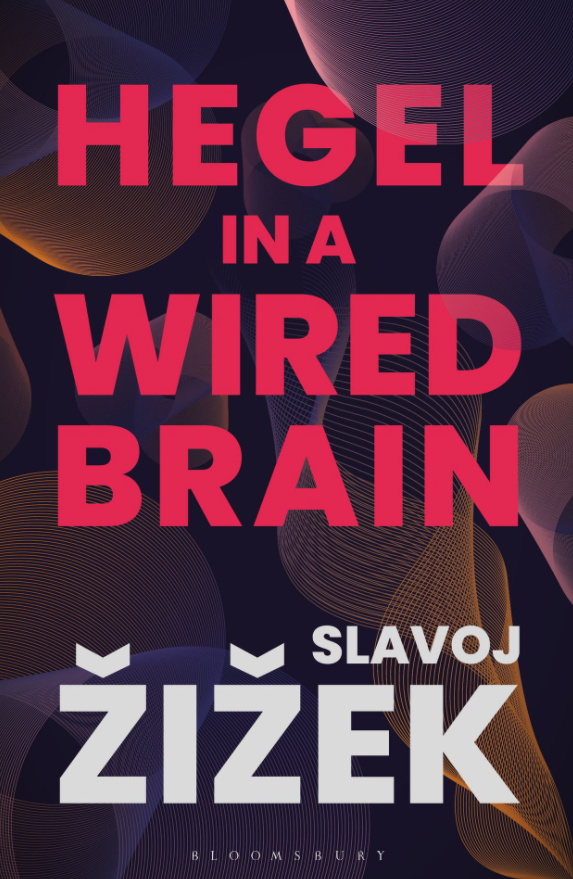Hegel in a Wired Brain, by Slavoj Zizek, 2020.
脳にコネックテッドされたヘーゲル
Hegel in a Wired Brain, by Slavoj Zizek, 2020.
解説:池田光穂
ヘーゲル哲学の刷新:全体論者、目的論者、論理的発展論者でないヘーゲルを見よ。 むしろ、彼を内在性、偶発性、歴史的開放性、逆説性の哲学者として理解せよ!!!
◎ Hegel in A Wired Brain, by Slavoj Žižek, 2020.
"In celebration of the 250th anniversary of the birth of G.W.F. Hegel, Slavoj Žižek gives us a reading of the philosophical giant that changes our way of thinking about our new posthuman era. No ordinary study of Hegel, Hegel in a Wired Brain investigates what he might have had to say about the idea of the 'wired brain' – what happens when a direct link between our mental processes and a digital machine emerges. Žižek explores the phenomenon of a wired brain effect, and what might happen when we can share our thoughts directly with others. He hones in on the key question of how it shapes our experience and status as 'free' individuals and asks what it means to be human when a machine can read our minds. With characteristic verve and enjoyment of the unexpected, Žižek connects Hegel to the world we live in now, shows why he is much more fun than anyone gives him credit for, and why the 21st century might just be Hegelian."
「G.W.F.ヘーゲルの生誕250周年を記念して、スラヴォイ・ジジェクがこの哲学の巨人を読
み解き、私たちの新しいポストヒューマン時代についての考え方を変えてくれるだろう。ヘーゲルの普通の研究ではなく、ヘーゲルが「ワイヤード・ブレイン」
という考え方について何を言いたかったのか、つまり、私たちの精神プロセスとデジタ
ル・マシンが直接結びつくとどうなるのかに
ついて研究している。ジジェクは、ワイヤード・ブレイン効果という現象、そして、私たちが自分の考えを他人と直接共有できるようになったら何が起こるかを
探求している。そして、それが私たちの経験や「自由な」個人としての地位をどのように形成するかという重要な問題に焦点を当て、機械が私たちの心を読むこ
とができるとき、人間であることは何を意味するのか、と問いかける。ジジェクは、ヘーゲルと私たちが今生きている世界を結びつけ、なぜヘーゲルは誰もが評
価するよりもずっと楽しいのか、そしてなぜ21世紀はヘーゲル的なものになるのかを、独特の活力と意外性のある楽しみ方で示している」。
 ●●
●●

Description
Slavoj Žižek gives us a reading of a philosophical giant that changes our way of thinking about our new posthuman era. No ordinary study of Hegel, Hegel in a Wired Brain investigates what he might have had to say about the idea of the 'wired brain' – what happens when a direct link between our mental processes and a digital machine emerges. Žižek explores the phenomenon of a wired brain effect, and what might happen when we can share our thoughts directly with others. He hones in on the key question of how it shapes our experience and status as 'free' individuals and asks what it means to be human when a machine can read our minds. With characteristic verve and enjoyment of the unexpected, Žižek connects Hegel to the world we live in now, shows why he is much more fun than anyone gives him credit for, and why the 21st century might just be Hegelian.
スラヴォイ・ジジェクは、ポストヒューマンの時代に対する私たちの考え方を変える、その彼の哲学の巨人を読み解く。ヘーゲルの普通の研究ではな
く、ヘーゲルが「ワイヤード・ブレイン」のアイデアについて何を言いたかったかを指摘している。ジジェクは、ワイヤード・ブレイン効果という現象、そし
て、私たちが自分の考えを他人と直接共有できるようになったら何が起こるかを探求している。そして、それが私たちの経験や「自由な」個人としての地位をど
のように形成するかという重要な問題に焦点を当て、機械が私たちの心を読むことができるとき、人間であることは何を意味するのか、と問いかけるのだ。ジ
ジェクは、ヘーゲルと私たちが今生きている世界を結びつけ、ヘーゲルが誰もが評価するよりもずっと楽しい理由、そして21世紀がヘーゲル的であるかもしれ
ない理由を、独特の活力と予想外の楽しさで示している。
Table of Contents
1)ポストヒューマンにおける警察国家、あるいは警察化した国家をみる
2)ワイヤード・ブレインのユートピア検証(言語や死を克服できるか?)「コミュニケーションと 死」
3)ワイヤード・ブレイン化は人々の主体(性)を弱体化させるか?——ジョージ・オーウェルや映 画マトリクスの未来は来るのか?——主体がなくなれば主体に帰される「道徳」がなくなるから俺たちは楽チンになるのか?
4)ワイヤード・ブレインという信仰(=カーツワイル教)のなかに、ハルマゲドンや(楽天的)黙 示録がみられる。あるいはカーツワイルの擬似神学
5)ニーチェの超人の発想と結局は繋がる
6)ラカン的無意識の再帰性——無意識の身振りが、ワイヤード・ブレインの発想から我々を自由に させてくれる
7)ワイヤード・ブレインの発想は空疎なユートピア。シンギュラリティは、主体の集合意識空間へ の接続ではなく、各人それぞれの独我論を担保するものという可能性(=実際のSNSの利用を 見ればわかる)を考えよ。ワイヤード・ブレイン・カルトの信者は、最後はデカルト主義者にな る。
"One should note in passing that the effects of the now-trite Deleuzo-Guattarian exhortations to eschew subjectivity and intuitively tend toward the flux of the ‘molecular’ (similar to the telos of Singularity) are clearly identifiable in contemporary Western culture, particularly online. While such commands – which remain foundational to the work of today’s foremost Deleuzo-Guattarian posthumanist interlocutors, such as Rosi Braidotti – were intended to propel us toward a world devoid of false universalisms and repressive structures, they have had inverse effects (an obvious result of drawing conclusions regarding what is to be done from foundationalist philosophies): an increase of self-referentiality and hyper-fragmentation. Thus, Žižek sharply hits the mark in questioning whether the wired brain, insofar as it is proposed as a vehicle to transcend (what appear to be) the obstacles that block our collective passage into divine collectivity, will be successful or whether it will simply cause subjectivity to ‘persist in its negation in an even purer form’ (142)."
"Finally, the epilogue serves as both a quilting point for the book, as well as a possible standalone text, comprising the book’s central elements and shading them with an eye toward the possibility of a digital apocalypse, with its economic, social and sexual consequences considered. He asserts that the eventual rise of the wired brain will indeed be apocalyptic, but after etymologizing the latter (‘uncovering’ in Ancient Greek), he suggests that the type of apocalypse to which it will give rise remains unbeknownst. Though it is clear Žižek is anything but a wired brain enthusiast, he truly abstains from taking sides and adopts, as he often does, the disinterested position of the psychoanalyst and takes the question of the wired brain seriously. His basic conclusion is that we should not assume the wired brain, if it somehow proves to be possible in concreto, will bring us into liberated territory, but rather to a space defined by even more stubborn contradictions than those which define human experience today. While some may deride this as typical Žižekian pessimism, we ought to keep with the book’s Hegelian spirit and enact a dialectical reversal so as to see this pessimism as resolutely courageous and endowed with the emancipatory impulse that is a necessary supplement to leftist politics in the present landscape."
主体性を排除し、直感的に「分子」の流動性を志向する(シンギュラリティの目的にも似ている)と いう、今ではすっかり定着したドゥルーズ=ガタリ派の呼びかけの効果は、現代の西洋文化、特にオンラインにおいてはっきりと確認できることを、一応指摘し ておく。こうした指令は、ロージ・ブレイドッティをはじめとする、今日のドゥルーズ=ガタリ派ポストヒューマニズムの第一人者たちの仕事の基礎となってい るが、誤った普遍主義や抑圧的な構造を排除した世界へと我々を導くためのものである一方で、自己言及性の増大と超分断化という逆効果(基礎主義(=基礎づけ主義)哲学から何 をすべきかという結論を導き出す際の明白な結果)ももたらしている。このように、ジジェクは、有線化された脳が、私たちの集団が神聖な集団性へと向かうの を阻む障害(と思われるもの)を超越する手段として提案される限りにおいて、それが成功するのか、それとも単に主観性を「より純粋な形でその否定に固執す る」ことになるのか、という問いかけにおいて鋭い的を得ている。
最後に、エピローグは、本書のキルティングポイントとして、また独立したテキストとして、本書の
中心的要素を構成し、デジタル黙示録の可能性を視野に入れ、その経済的、社会的、性的影響を考慮した上で、その陰影をつける役割を果たす。彼は、ワイヤー
ド・ブレインの最終的な台頭は確かに終末的であると主張するが、後者(古代ギリシャ語で「発見」)を語源とした上で、それがどのような終末をもたらすかは
未知数であることを示唆している。ジジェクがワイヤード・ブレイン愛好家でないことは明らかだが、ジジェクはどちらかの側に立つことを本当に避け、彼がよ
くするように、精神分析家の利害関係のない立場を採用し、ワイヤード・ブレインの問題を真剣に受け止めている。彼の基本的な結論は、ワイヤード・ブレイン
が何らかの形で具体的に可能であると証明されたとしても、それが私たちを解放された領域に導くとは考えるべきではなく、むしろ今日の人間の経験を規定する
ものよりもさらに頑固な矛盾に規定された空間に導くべきだというものである。これを典型的なジジェク的悲観主義と揶揄する人もいるかもしれないが、私たち
は本書のヘーゲル的精神に則り、この悲観主義を断固とした勇気と、現在の風景における左翼政治を補完する必要な解放的衝動に満ちたものとみなすために、弁
証法的逆転を実行すべきである。
+++
▲▲
ラヴォイ・ジジェク: 有線脳の中のヘーゲル (Slavoj Žižek: Hegel
in A Wired Brain)
++
リンク
文献
その他の情報
++
Copyleft, CC, Mitzub'ixi Quq Chi'j, 1997-2099
Acknowledgement; This work was supported by JSPS KAKENHI Grant Number 20K01216.